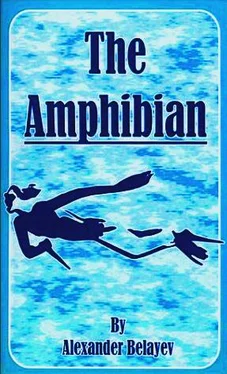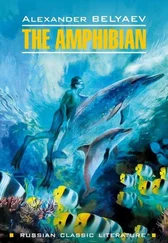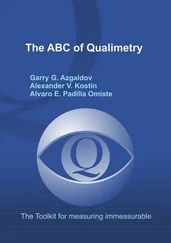1 ...6 7 8 10 11 12 ...42 One day he came across Jim lying fast asleep in the shade of an olive tree. The Black was lying on his back, his mouth hanging open. Cristo used the opportunity of looking for the Black’s tongue and, to his relief, found it there all right.
Dr. Salvator’s day was well-planned and busy. From seven to nine he received patients, from nine to eleven he operated upon those who required it. Then he went to his villa to do laboratory work. This involved operating on animals and studying them. An experiment over, the animals went back to the orchard. Cristo, who dusted the rooms in the villa, managed occasionally to slip into the laboratories. The things he saw there would haunt his imagination for long afterwards. Hearts and kidneys carved out of their bodies lived on in glass jars. Amputated limbs seemed to be waiting for their owner.
His skin crawling Cristo hurried out. He preferred to be among the live monsters of the orchard.
Salvator seemed to trust the old Indian, but not beyond the third wall. And it was just what was on the other side that Cristo was so eager to see. One midday, when everybody was having a siesta, he stole up to the wall. Children’s voices floated over to him. They spoke an Indian dialect he knew but intermingling with them, as if in a quarrel, there were other voices, thin and squeaky, speaking what seemed to Cristo a very peculiar brand of Indian.
Coming across Cristo in the orchard one day Salvator halted and, looking him straight in the eye as was his wont, he said:
“You’ve been with me a month now, Cristo, and I’m pleased with your work. One of the servants in the lower orchard has fallen ill. You will replace him. You will see many new things there. But mind that little conversation we had about your tongue unless you want to lose it.”
“I’ve almost forgotten the use of it with all your dumb Blacks around, Doctor,” said Cristo.
“Excellent. Silence pays, you know. Incidentally, do you know your way in the Andes?”
“I was born and bred in the mountains.”
“Splendid. I will soon want to replenish my zoo with a new batch of birds and animals. I’m going to take you with me. You may go now. Jim will take you to the lower orchard.”
Accustomed though he was to the wonders of the place, Cristo had more surprises coming.
In the spacious sunlit meadow naked children were playing with monkeys. Almost all Argentina’s Indian tribes seemed to be represented there by children ranging in age from about three to twelve years. All of them were patients of Salvator’s. Many had undergone complicated operations and owed their very lives to Salvator’s skill. Once round the corner the children recuperated playing in the orchard till they were strong enough to be taken home.
Tailless monkeys with not a tuft of hair on their bodies kept them company. But what really amazed Cristo was that all of them could speak some kind of Indian. They joined in the children’s games, quarrelling with them and shouting in thin high-pitched voices, though on the whole they were quite a friendly crowd.
Sometimes Cristo was inclined to think they were human beings after all.
The lower orchard, as Cristo soon found out, was smaller than the other one, sloped steeper seawards and ended in a big cliff rising sheer like a wall. Somewhere behind it was the invisible ocean, revealed by the roar of the surf.
A closer look showed that the cliff was man-made and, in fact, nothing more than another wall, a fourth one, for in it Cristo found an iron door, painted grey to blend with the cliff and furthermore screened by a thick growth of wistaria.
Cristo listened. The roar of the surf was the only sound. Where did the small door lead to? The seaside?
Suddenly there was a hubbub of children’s voices behind him. Cristo wheeled round and saw the children staring up into the sky. He also looked up and spotted a small red balloon slowly floating up and across the orchard. The wind was heading it seawards.
An ordinary children’s balloon, it seemed to stir Cristo deeply. As soon as the servant that had been ill reported for work, the old Indian went to see Salvator.
“Soon we’re leaving for the Andes, Doctor. It might be some time before we come back. May I go and see my daughter and her child?”
Salvator didn’t like his servants leaving the premises, and he didn’t speak at once. Cristo stood waiting, his eyes boldly meeting the cold stare of Salvator’s.
“Remember your pledge,” said Salvator. “I wouldn’t like you to lose your tongue. You may go, but see you’re back within three days. Wait! “
Salvator went into the other room and brought back with him a suede leather pouch.
“There’s something for your granddaughter — and for your silence too.”
“If he doesn’t come this time I’ll cut the painter as far as the pair of you are concerned, I’ll be damned if I won’t. I’ll get smarter people onto the job,” Zurita was saying, tugging impatiently at his bristly moustache. He wore a white town suit and a panama hat. They had met well outside Buenos Aires, at a point where the pampas were taking over from the maize fields.
Baltasar, in a white blouse and a pair of blue-striped trousers, was squatting by the roadside, plucking dejectedly at the sun-parched brittle blades of grass.
He himself was beginning to regret having sent his brother to spy on Salvator.
Though Baltasar’s elder by ten years, Cristo was strong and lithe and as cunning as a pampas-cat. But he was not reliable. He couldn’t settle down to anything. There had been a time he took up farming but soon dropped it, thoroughly bored. Then he ran a dockside tavern till he drank himself out of house and home. Lately Cristo had been earning a precarious living on the windy side of the law. With his sharp wits he could ferret out anything but was not to be trusted with much. He might even betray his own brother if it were made worth his while. Baltasar knew his man and was as worried as Zurita.
“Are you sure Cristo saw the balloon, anyhow?”
Baltasar shrugged his shoulders. He would have much preferred to drop the whole affair there and then, go home and have a glass of cold water laced with wine in the peace and quiet of his shop.
A cloud of dust mushroomed over the turn of the road and was lit up by the last rays of the setting sun. A shrill drawn-out whistle was heard.
Baltasar livened up.
“That’s him! “ he said.
“Not too damned soon either,” said Zurita.
Striding briskly towards them was Cristo — no longer a doddering old Indian with a sick grandchild come to see the doctor. Giving another whistle Cristo came nearer and saluted the pair.
“Well, have you seen the ‘sea-devil’?” Zurita asked him by way of greeting.
“Not yet, but he’s there all right. Salvator keeps him behind four walls. The main thing is Salvator trusts me. That sick granddaughter did it.” Cristo laughed, narrowing his sly eyes. “She nearly gave the whole show away though. When she recovered, I mean. Here’s me, picking her up and kissing her like a loving grand — dad and she kicks away and fairly bursts into tears,” and he laughed again.
“Where did you get the girl?” asked Zurita.
“Money’s hard to get, girls aren’t,” said Cristo. “And her mother’s happy too. I got five pesos-she got her daughter back healthy.”
That he had also received a sizeable sum from Salvator he didn’t trouble to mention. All the more understandable this, since he wasn’t going to share it with the child’s mother.
“A regular zoo that place — chock-full of monsters.” And Cristo started his story.
“That might all be very interesting,” Zurita said after some time and lighted a cigar, “but you haven’t seen the goods. What do you propose to do next?”
Читать дальше
Конец ознакомительного отрывка
Купить книгу










